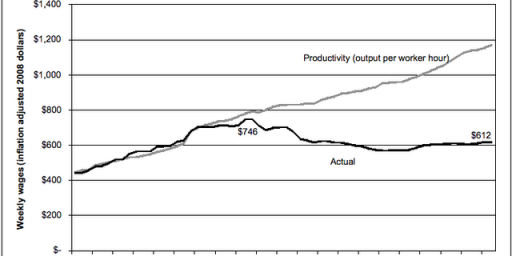BOGUS NUMBERS
Dan Drezner cites a couple of studies that point to a general problem in capturing economic (or any?) reality with statistics: that the concept we’re measuring is itself a moving target.
David Malpass of Bear Stearns thinks the federal data fail to take into account the degree to which companies are now contracting out work. The reasons for that contracting are often negative–screamingly high health-care costs for employees, the pressures of post-crash and post-Enron government regulation. But the consequence is that workers may be under-recorded.
Malpass points to other data that indicate hidden growth or hidden growth potential. Non-farm proprietors’ income, a measure that looks at the profitability of unincorporated business, is up strongly; the growth outpaces late-1990s rates. The number of self-employed in the Household Survey has risen sharply as well. This suggests a strong recovery, since new businesses are an engine of U.S. growth. Now we come to another big measure: productivity, which was at a disconcerting high of 9.4 percent last quarter. The formula for determining productivity is output divided by labor and other inputs, more or less. So if the statisticians are undercounting labor, productivity may be less impressive than advertised.
The very nature of what it is to be “employed” is changing–in both positive and negative ways. But this makes statistically capturing the obverse–“unemployment”–rather difficult. (And, incidentally, comparing unemployment figures over time rather dubious.) Dan points out that while we’re therefore likely overstating the number of unemployed, we’re also probably overstating “productivity,” since we’re not counting as inputs all the workers that produce the output.
We’ve had similar problems gauging inflation and setting appropriate levels for cost of living adjustments: The nature of the “market basket of goods” changes over time as new technologies displace old ones, our habits and “needs” change, and so forth.





